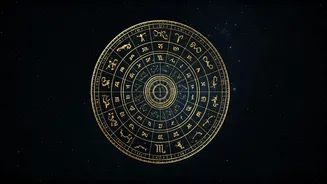Origins of Astrology
Astrology's roots stretch back thousands of years, originating in ancient civilizations like Mesopotamia. Initially, astrologers observed the movements
of celestial bodies, associating them with earthly events. These observations evolved into sophisticated systems, blending astronomy with spiritual interpretations. Across cultures, from ancient Greece to China, astrology developed distinct methodologies, reflecting the unique worldviews of each civilization. The Egyptians, Babylonians, and Greeks were among the first to meticulously document celestial movements, linking them to human affairs. Their observations laid the groundwork for the astrological practices we recognize today, shaping a practice that continues to evolve and fascinate.
Core Astrological Principles
Astrology operates on the core belief that the positions of celestial bodies at the time of a person's birth influence their personality, relationships, and life path. The zodiac, a band of constellations, forms the backdrop for these interpretations, with the sun, moon, and planets positioned within specific signs at any given time. Each planet represents different aspects of life, such as love (Venus), communication (Mercury), and action (Mars). The interactions between these planets, known as aspects, create a unique blueprint for each individual, influencing personality traits, strengths, and challenges. Understanding these principles allows for deeper self-awareness and a framework for navigating life's complexities.
Birth Chart Analysis
The birth chart, or natal chart, is a personalized map of the sky at the moment of an individual's birth, offering a snapshot of celestial positions. It's a critical tool for astrologers, providing a detailed understanding of a person's character, potential, and life path. The chart is divided into twelve houses, each governing a specific area of life such as career, relationships, and health. The placement of planets within these houses and their relationships to each other (aspects) create a unique narrative. Analyzing the birth chart involves examining the signs on each house cusp, the planets within each house, and their interactions. This analysis offers profound insights into one's strengths, weaknesses, and the challenges and opportunities one might face throughout life.
Different Branches of Astrology
Astrology encompasses various branches, each with its unique focus and methodology. Natal astrology is the most common, centered on interpreting birth charts. Predictive astrology uses planetary movements and transits to forecast future events and trends in a person's life. Horary astrology answers specific questions by constructing a chart for the time the question is asked. Mundane astrology analyzes the influence of celestial bodies on world events and nations. Synastry focuses on relationship compatibility by comparing two birth charts. Each branch offers specialized insights, catering to diverse interests and needs. These distinct branches provide different perspectives, allowing for tailored exploration of astrological influences, from personal development to global trends.
Astrology and Personality
Astrology offers a fascinating lens through which to understand personality, linking traits to the twelve zodiac signs. Each sign, with its ruling planet and element (fire, earth, air, water), portrays distinct characteristics. For example, Aries, a fire sign, is often associated with courage and leadership, while Taurus, an earth sign, values stability and sensuality. Gemini, an air sign, is known for communication skills, while Cancer, a water sign, is often empathetic and nurturing. Understanding these sign-based profiles allows for deeper self-awareness and helps explain behaviors and tendencies. The sun sign is just one aspect of a person's astrological profile; the moon sign, rising sign, and other planetary placements add layers of complexity, offering a nuanced portrait of individual character.
Astrology and Relationships
Astrology also provides insights into relationships, offering a framework for understanding compatibility between individuals. Synastry, the branch of astrology dedicated to relationships, compares two birth charts to assess potential dynamics and challenges. By examining the interactions between planets in different charts, astrologers can identify areas of harmony and friction. This analysis can reveal how two individuals may complement each other, what communication styles they might have, and potential areas of conflict. Compatibility is not solely determined by sun signs; the placement of Venus, Mars, and other planets also plays a significant role in the dynamics of relationships. Using astrology helps in understanding the needs of both partners, encouraging mutual growth and fostering stronger bonds.
Astrology and Life Path
Astrology is also a useful tool for exploring one's life path and understanding broader trends. By examining transits and progressions, astrologers can predict potential challenges and opportunities over time. Transits observe the current positions of planets in the sky and how they interact with a person's birth chart. Progressions show how the chart evolves over time. These techniques can provide guidance in career, relationships, and personal development. Astrologers often use these tools to help individuals make informed decisions, manage challenges, and navigate life's complexities. Understanding the alignment of the stars allows for recognizing pivotal periods and making choices aligned with one's potential, encouraging self-discovery and personal growth.
Criticisms and Skepticism
Despite its popularity, astrology faces criticism and skepticism from scientific and academic communities. Critics often point out the lack of empirical evidence to support astrological claims. The fundamental premise of astrology, that celestial positions influence human events, often clashes with scientific understanding of cause and effect. Another point of contention is the broadness of astrological descriptions. The same traits are associated with millions of people who share the same sun sign. Despite these criticisms, astrology continues to attract believers who value its insights into their lives. They argue that its value lies in self-reflection, providing a framework for understanding personality and human behavior.
Modern Astrology
Today, astrology has evolved, blending ancient wisdom with modern applications. Online platforms and apps provide birth chart calculations, interpretations, and daily horoscopes, making astrology accessible to a wide audience. Astrologers have embraced technology, using software to generate detailed charts and conduct complex analyses. Modern astrology incorporates psychological perspectives, viewing astrology as a tool for self-discovery and personal growth. Despite its evolution, astrology remains a practice that encourages self-reflection and insight into the world. Its enduring appeal suggests its capability to resonate with diverse audiences, regardless of changing times or beliefs.




















